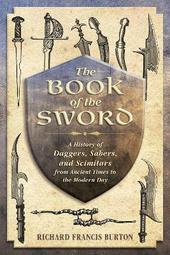
|
The Book of the Sword: A History of Daggers, Sabers, and Scimitars from Ancient Times to the Modern Day
Paperback / softback
Main Details
| Title |
The Book of the Sword: A History of Daggers, Sabers, and Scimitars from Ancient Times to the Modern Day
|
| Authors and Contributors |
By (author) Richard Francis Burton
|
| Physical Properties |
| Format:Paperback / softback | | Pages:336 | | Dimensions(mm): Height 210,Width 140 |
|
| Category/Genre | Military history |
|---|
| ISBN/Barcode |
9781626364011
|
| Classifications | Dewey:623.44109 |
|---|
| Audience | |
|---|
|
Publishing Details |
| Publisher |
Skyhorse Publishing
|
| Imprint |
Skyhorse Publishing
|
| Publication Date |
16 January 2014 |
| Publication Country |
United States
|
Description
"The history of the sword," the author writes in his introduction, "is the history of humanity." For centuries, the sword has been a symbol of power, strength, liberty, and courage. In the Middle Ages, the image of a sword was used to signify the word of God. Nearly every culture in history has forged blades from stone or steel to fight in times of battle and protect in times of peace. In this groundbreaking work, Richard Francis Burton, explorer, translator, scholar, and swordsman, draws on a wealth of linguistic, archaeological, and literary sources to trace the millennia-old history of the sword. From its earliest days as a charred, sharpened stick to the height of craftsmanship in the modern era, the sword has been the weapon of choice for warriors of all stripes. In eloquent, captivating prose, Burton describes: * Dirks * Daggers * Knives * Sabers * Cutlasses * The origin of the weapon * The weapons of the age of wood * The Copper Age of weapons * The Iron Age of weapons * The sword in ancient Egypt * The sword in ancient Greece * And more Nearly three hundred line drawings enhance Burton's richly detailed text. Any reader of history or student of weaponry will find this book a fascinating, highly enjoyable read.
Author Biography
Richard Francis Burton was an explorer, translator, writer, soldier, spy, fencer, and diplomat. He is most famous for his translations of One Thousand and One Nights and the Kama Sutra and for having been the first European to visit the Great Lakes of Africa. He traveled to Mecca in disguise and spoke nearly thirty languages. He died in 1890.
|